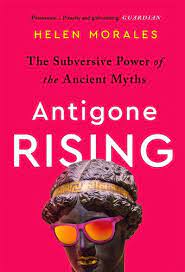Right off the bat, I honestly adore any book about the modern relevance of Classics, so for me this book was instantly a win. As a previous fellow of Newnham College at Cambridge, Argyropoulos Chair in Hellenistic studies at the University of California and (the deciding authority for some Marvel fans), a former prof. of Tom Hiddleston, Morales is an authority on the subject of myth.
A battle classicists, historians and archeologists often face is so what? Why should you care about Classical myths, about the politics of ancient Athens, the people that lived, loved, created and died not a millennia but two, ago? Helen Morales’ book ‘Antigone Rising’ addresses just that. From dieting to serial killers Morales explores the subversive hold Classical Civilization has upon our ‘modern’ society and reminds us that myth can be read in different ways – that it can be used to justify harmful practices but also to challenge them.
‘Killing Amazons’ and ‘#METU’
The aspect of this book I really enjoyed was the fact that the negative influence of ancient myth is not shied away from. Morales is keen to emphasize the harmful ways that Classics has impacted our society and opens with her first chapter – ‘Killing Amazons’. Essentially the point made here is that Greek heroism was often defined by the murder of a Nomadic Tribe of women – mythological warriors one of whose queens inspired DC’s ‘Wonder Woman’, Diana. Achilles, Herakles, Bellerophon (the rider of Pegasus) all achieved heroism, one way or another, in their killing of Amazons. That in-itself is a harmful message for any hero to carry especially a hero, in the case of Herakles, who is still considered ‘heroic’ to this day, but Morales also addresses the issues that run much deeper.
We base so much of what society should look like by turning to the Classical world, whether that is myth or history. The values that are found in myth are therefore an undercurrent in our own society, which is what Morales is keen to drive home in her book. She attributes these undercurrents to the horrifying attitudes some men have towards women that are shown in murder cases like the ‘Isla Vista’ killer whose motive he documented as “I don’t know why girls aren’t attracted to me but I will punish you all… whose the alpha male now bitches?”. Morales describes this to be “the word of thousands of years telling the same stories”.
The negative impact of Greco-Roman myth on today’s women is explored further in later chapters such as ‘The Women controllers’ (addressing the ancient roots of dress codes) and ‘#METU’. I found #METU to be particularly poignant, exploring classical attitudes towards sexual assault that have carried through into our own society. Morales makes the point that ancient myth dramatizes and idealizes sexual assault time and again and points out that: “There are more paintings displayed in art museums in Europe and North America that feature a mythological rape scene than there are paintings displayed by female artists of colour”. Even the night sky is filled with mythological rape scenes – Jupiter’s Galilean moons are named after god Jupiter’s victims – Io, Europa, Calisto and Ganymede.
Dieting with Hippocrates
Most people know Hippocrates right? The Hippocratic oath doctors have to take is inspired by him, although other than that, most of his medical views have been left behind in favor of more modern hypotheses. One of his quotes is however used to scaremonger by dieting books – “Sudden death is more common in those who are fat”, which these books take to mean “If you are fat you will die”. Morales points out firstly, that Hippocrates is also well known for recommending a cure for baldness to be to mix and apply opium, horseradish, beetroot, pigeon feces and spices – perhaps making a strange figure to use a modern medical authority. We are also reminded that the quote is not accompanied by context and could mean a variety of different things possibly even – ‘if you are dying you will go quicker if fat’. These books also neglect the fact that Hippocrates also states that “When in a state of hunger, one ought not to work” seemingly then, he would not have advocated for some of the extreme dieting regimes promoted by the same books that use his own words. Whilst the misquoting of Hippocrates in this situation might make some purists’ blood boil, the problem arises not from an incorrect use of Hippocrates but what can be a harmful one and demonstrates that Classics is still relevant in a potentially negative way which Morales goes on to explore further in this chapter – but I’ll let you find out how for yourself (we don’t want to spoil all the juicy Classics nuggets in one go now do we?).
Diana, The Hunter of Bus Drivers
With one of my favorite titles of the book, this chapter addresses use of myth in the realm of serial killers specifically ‘La Diana, la Cazadora de Chofres’ or ‘Diana, the Hunter of Bus Drivers’, a Mexican killer who operated in her home town of Ciudad Juárez in 2013. This woman modelled herself after the virgin huntress, known for her role as a protector of women in childbirth and for saving women of antiquity from death in childbirth. This goddess is perhaps better known as the Artemis who had Actaeon ripped apart by his own hunting dogs for watching her bathe, her Roman name? Diana. As Morales puts it “This Diana killed with a handgun, not a bow and arrow”, she shot two bus drivers, one when entering a bus and one on exit and is alleged to have whispered in the ear of one of her victims “You guys think your real bad don’t you?”. A day later this message was emailed to local news stations:
“You think that because we are women we are weak, and that may be true but only up to a point, because even though we have nobody to defend us and we have to work long hours until late into the night to earn a living for our families we can no longer be silent in the face of these acts that enrage us. We are victims of sexual violence from bus drivers working the maquila shifts here in Juárez, and although a lot of people know about the things we’ve suffered, nobody defends us nor does anything to protect us. That’s why I am an instrument that will take revenge for many women. For we are seen as weak, but in reality we are not. We are brave. And if we don’t get respect, we will earn that respect with our own hands. We the women of Juárez are strong.” Signed as Diana, the Hunter of Bus Drivers.
Bus drivers in Juárez had been previously accused of rape and murder of women and across the city 1,600 women had been murdered from 1993 to 2017. For many women who worked on the late night ‘maquila’ shifts, “bus driver meant rapist”, she was symbolically “waging a war on all of the city’s rapists” and has never been caught.
Clearly in this case, the means could never be condoned, but the message, the reimagining of myth in this way is an example of the relevance of Classics. Not just in that relatively recent killers have modelled themselves and their causes after myths but also in that some of the messages of myth can provide strength to the oppressed.
BΣYΘNCΣ, goddess
This is where we begin to see the ways in which Classics are used to support good causes, where they can be reinterpreted in a historically faithful way that changes the value of Greek myth. Morales in this chapter highlights the work that Beyonce has done through her art to change the face we associate with Classical myth. Making visible her “foremothers of power”, Beyonce has depicted herself as Nefertiti (an Egyptian queen), Aphrodite (in her pre-existing role as first of all a mother) and Osun (“a Yoruba spirit of fresh water, who is connected with fertility, beauty and love and who gives her name to the Osun River in Nigeria”). Morales talks about how Beyonce challenged the flawed assumption that the characters of ancient Greece were white due to the white marble statues we have that would have in fact been painted in a myriad of colours and certainly did not depict only white people. Morales goes on further to analyze in depth, Beyonce’s takeover of the Louvre in her music video of ‘Apeshit’.
The raiding of Classics by fascist groups like the Nazi party to create a tradition of white supremacy is an example of how Classics can be used to promote harmful agendas, but Morales is keen to highlight the work the Beyonce has done to combat such ideologies by reinterpreting antiquity in a way that is fit for and resonates with modern audiences.
This is a really enjoyable, thought provoking book, and I can by no means do it justice in this short review. There yet more chapters on Trans mythology, sex strikes, dress codes, environmental equality that explore other ways that Classics has influenced our lives now but also the ways we can use Classics – for good or for bad. Morales rounds up with an eloquent answer to why the study of Classics is so valuable to our society today:
“By turning to the past, we can imagine our future afresh. And that recognizing the subversive power of ancient myths – through reading the original stories closely and enjoying their modern recreations and using them to inspire and support political activism – can be both transformative and redemptive”.

